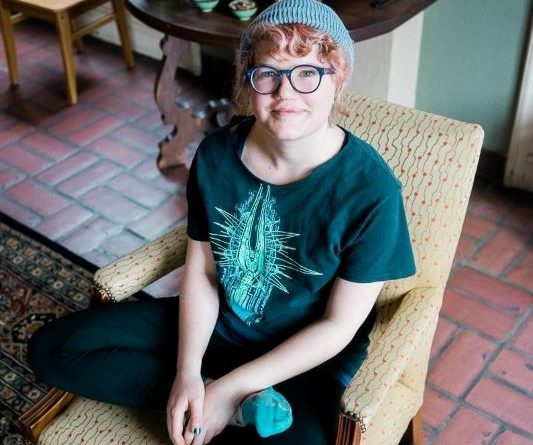Accepting What Is
By Catherine Moon
This morning I sat on top of the rooftop at San Francisco Zen Center and looked out over the city and the Bay. The city looks clean in the morning light; every time I look at the busy buildings with their urgent lines in the softness of the day’s nascent light, it all seems much more innocent and content.
It is a beautiful view from atop this building–I feel like I can see most of San Francisco. I can see, without trouble, the new behemoth skyscraper that dominates the skyline, SalesForce Tower, and it’s sidekick, the Millennium Tower, right beside. I can see the pyramid top of the historic Trans-America building. I can see across the bay towards Oakland and Berkeley, and even, on a day that’s particularly clear, Mount Tamalpais in Marin County to my north.
It is a difficult thing for me nowadays to look around and behold something beautiful and grand without wondering about how it will fare in the impending crises of our century; I have a belief, not entirely unsound in what I consider to be the facts, that we are living in the throes of the end. The end of what, I’m not quite sure. My hope is that the end belongs to the patriarchal and capitalist foundations of our society built by a handful of delusional and rapacious people, systems that have for so long encouraged the domination of most of the peoples and our planet.
I fear that it actually might be the end of everything humanity has known.
I’ve heard by many that this is not the first generation that has feared the apocalypse. I don’t know why I think this time it’s different, and special, and real. Perhaps every apocalypse-fearing generation felt that way–I just feel like it’s different now because we have every reason to be afraid; we carry the fear of every generation before us as it’s lived out everyday in the news.
I not only have to fear the end of so much I love because of the threat of nuclear annihilation or famine or natural disaster or disease or genocide (all of which are more present than ever), but also the burning of the world and the extinction of our brother and sisters, mass-shootings so commonplace I barely even process them anymore, and the impending possibility of domination by artificial intelligence.
There’s so much pain in this world as it’s hurtling towards the end of something, and it’s all fed to us daily, all of it, through these glowing boxes that regularly encourage isolation and loneliness, depression and anxiety. It’s all too much for our limited human minds and hearts to hold.
And yet there’s still beauty in the world; there’s so much of it that it too is too overwhelming to hold.
Inherent in the nature of beauty is the knowledge that it is fleeting, or so I believe. The idea that something is beautiful, not despite but because something will end, is by no means a novel one. It is an idea inherent in most poetry and art throughout cultures and time. A flower or child is beautiful because soon you know it will change into something or someone else.
To feel the ecstasy of beauty is to let your self feel all things–the joy, the sorrow, the aches, the fear, the irritation, the devotion. Feeling beauty is the experience of all there is to experience, and we humans are given this gift because we know, although we may choose to ignore it, that everything ends, including us–our lives, our species, our world.
I am, perhaps, feeling a bit more pensive sitting in this rooftop garden than I otherwise would. I am about to move, in a few days time, away from San Francisco and Zen Center and California. I am about to move away from my life of the past three years, training as a Zen Buddhist monastic in modern America. Something beautiful is about to end.
I have complete faith that it is time; I have felt a ripening, and I am ready to be harvested. It is because of my training as a Buddhist that I have so much belief in the change that is happening; in the fact that nothing lasts and that to hold on to something is futile and delusional. That to accept what is happening as it is, is the only way to have a peaceful and content existence.
That acceptance is more easily applied to my moving back home to Colorado than it is to the impending apocalypse, sure. And yet it is true for both. It is a difficult thing to accept “what is” when “what is” is so terrifying. And yet I also hold the belief that we are in our current predicament because humans have forgotten what it is to accept “what is”. We have been trained, slowly, generation by generation, to forget what it is to be alive and in love with the world. We have forgotten what it is to abide in beauty, to abide in the natural passage of everything.
To accept that something will end, truly, is to appreciate and celebrate and honor what it is right now.
It is stopping and smelling the cherry blossoms, and watching the sun fade behind hills. It is being lifted to transcendent heights while listening to a crescendo only to be brought back down before the end of the song. It is to prepare and enjoy a meal. It is to make love, to fall in love, with someone you know will not always be there.
If the world is ending, if your life will one day end, if everything is always ending, someday, why not love everything as much as you can today? Why not fall in love with the world? And with this love, as in all great loves, celebrate it as much as you can as it is — knowing that it will change. Accepting that it will change.
And of course, an important part of love is not existing in it acquiescently and submissively. It is to engage with it whole-heartedly. Acceptance of “what is” is not a passive thing. It is an incredibly active thing. It is being willing to see things as they are. It is being willing to know things as they are.
Acceptance is not yielding to rampant misogyny, but instead celebrating womanhood and the divine feminine. It is not assenting to racism and xenophobia, but instead being willing to be humble and curious about other religions, cultures, and ways of life. It is not complying to cis-hetero norms, but instead celebrating love and identity and personhood in all of its fascinating, myriad ways.
In essence, in my mind, accepting “what is” is not choosing to abide in willful ignorance of hurtful systems, but instead actively choosing to honor, even revere, that which is whole and special. It is choosing to honor the divinity of everything, and to fall in love with it.
How you can do this, I can’t say. You get to explore that for yourself, which is actually one of the lovely things about it. The adventure of untangling all of that which divides you from “what is” is, to me, one of the most beautiful things there is–and so, of course, it is an elusive, fleeting, ever-changing thing–which of course, only makes it more beautiful. Who would want to dance with a partner who only knows one step?
I can say that for me one of the ways that it has recently taken form is in discovering and accepting how much I love pigeons. It’s a silly story how I came to this love I have for the “rats of the sky”, as they are not-so-lovingly referred to, and yet it is a real story and it is marvelous. People think it’s strange to love pigeons, and that element of absurdity only makes the beauty I find in those birds and in my love for them all the more delightful.
It is one thing to know something in your mind, and another thing to feel what you know, to have it exist in your body. It is one thing to know, on some philosophical level, that the ending of things is not inherently bad. Nor are the feelings you have around the end of things. However, in my experience, it takes a lot of concentrated effort to realize the beauty of the end of things, and to celebrate the passage of life.
I believe we are reaching the end of something quite big. I cannot claim to know what that is. I know I am afraid, everyday, in my bones. I know I am angry, quite often. I know I am profoundly disturbed and heartbroken about all that is being destroyed around me everyday, senselessly. I also know it is good for me to feel these things. It is good to be a human. Humans are terribly confused creatures, and that confusion results in a lot of harm. Humans are also incredibly courageous creatures, and wonderfully complex creatures.
I love many things and many people. I find many things to be beautiful. And in the face of this terrible unknown, I hope I can keep choosing to accept and know, fully, everything that I can. I feel I will celebrate all that is marvelous while I still can.
Catherine Moon Masters is currently transitioning from her life of quasi-monkhood back into a life in “the marketplace”. She is also exploring what it is to be an artist. Her portfolio website containing her painting, drawing, poetry, photography, and writing can be found at www.wondrousmoonstudio.com.

